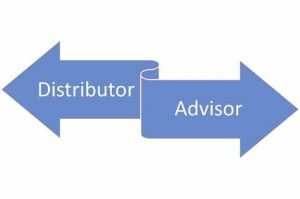Due to the prevalence of technology, decisions are made poorly when there is a lack of knowledge, information, and trust among different age groups. Investments require thorough market and fund knowledge, as well as broker trust. Most novice investors rely on distributors or advisors to show them the right path because they need more time and expertise. This blog’s goal is to define Mutual Fund Distributors (MFDs) and Registered Investment Advisors (RIAs), as well as how to select one.
Mutual Fund Distributor (MFD)
The term “mutual fund distributor,” also known as “MFD,” refers to a person or organization that is governed and registered with SEBI (Securities and Exchange Board of India) and the Association of Mutual Funds (AMFI) and who serves as an intermediary to assist investors in purchasing and disposing of mutual fund schemes.
An MFD may be connected to a single or several mutual fund houses. By providing you with the investment plan that best suits your financial goals based on your risk appetite, they help you make investment decisions. They are compensated by the mutual fund companies.

They regularly track fund information and keep an eye on the performance and operation of the mutual fund sector. They also carry out qualitative and quantitative analyses using databases.
An MFD carries the following duties for its clients:
- Determining a client’s risk appetite
- Deciding the asset allocation
- Recommending relevant mutual fund schemes across equities, debt, gold etc.
- Executing the investments on behalf of the clients via SIP or lumpsum
- Monitoring and tracking the performance of schemes
- Suggesting suitable changes from time-to-time
Eligibility of an MFD
- 18 and above of age.
- Qualify for either class 12 or class 10 with three years of diploma.
- As SEBI requires, the applicant must pass the NISM Series V-A certification exam.
- Every employee in a company that uses MFD must be certified.
- Candidates who pass the NISM certification test are given an AMFI Registration Number (ARN), which is valid for three years.
Registered Investment Advisor (RIA)
Registered Investment Advisors (RIAs) are people or businesses that have registered with SEBI to offer clients financial guidance and help in areas like:
- Decide on and evaluate financial goals.
- Risk profiling to comprehend the client’s risk tolerance.
- Recommend a suitable asset allocation based on the client’s risk tolerance.
- Recommend suitable mutual fund plans and other financial products depending on the client’s financial targets, risk tolerance, and asset classes.
- Review the suggested financial products frequently and adjust as necessary.
- Advise on tax planning, estate planning etc.
They are required to create a formal and a written investment plan for their investors, considering their objectives, finances, as per the guidelines from SEBI. As a result, they accordingly charge out-of-pocket fees from clients for the said services. The fee structure can be any of the below:
- Current prices: Ongoing costs for the services rendered.
- Flat fee: an annual fee set by the advisor and the investor after consultation.
- Percentage of Assets: Collected as a proportion of the assets. As the asset base grows, the fee increases in line with the growth.

Eligibility of an RIA
- Five years of experience in the industry in addition to professional certification, master’s degree, or diploma in finance, business management, banking, capital markets, accounting, commerce, economics, or insurance.
- Level 2 certification from NISM.
- Applicants must have a minimum net worth of INR 5 lacs.
- Net worth for organizations must be at least INR 50 lacs.
Difference between MFD and RIA
| Parameters | MFD | RIA |
| Services rendered | Recommends suitable mutual fund schemes/ETFs based on a client’s risk appetite and financial goals | Provides advice and guidance on a client’s investment portfolio, tax strategies etc. |
| Tie-up | Collaborates with all mutual fund companies and helps its clients execute the transactions also | There isn’t a particular connection to any mutual fund provider. They usually only provide advice. |
| Minimum Investment Amount | Varies from MFDs but most accept investments starting as low as INR 1,000 | Usually starts at about INR 5 lakhs given the costs involved. |
| Fees | Commissions from the fund house | Out-of-pocket monthly/quarterly/yearly advisory fees from the clients |
| Regulation | Registered with AMFI and regulated by SEBI. | Registered and regulated by SEBI. |
| Mode of delivery | Completely online | This may involve physical meetings |

Conclusion
The decision ultimately depends on the investor and what he or she needs. If an investor wants advice and guidance solely on their mutual fund investments, then they are better served by an MFD. But if one has more complex financial needs that require assistance with tax planning, estate planning etc. they should consider getting the help from an RIA. One must weigh the costs and benefits involved with both options before taking any decision.





